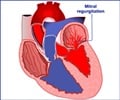
‘Frailty predicts mortality, length of hospital stay, chance of readmissions after mitral valve surgery.’
Read More..Tweet it Now
Dr. Iyengar and colleagues from Penn Medicine, examined data from the National Readmissions Database (NRD)--an archive that includes discharge information from hospitals across more than 20 states and is helpful in estimating immediate outcomes after surgery.Read More..
The researchers identified 102,114 adult patients who underwent mitral valve replacement surgery between 2010 and 2014. After various exclusion criteria were applied, 50,410 patients composed the final study group. Among these patients, frailty was present in 7.9%.
The researchers found that frail patients were more likely to experience complications after surgery (76.7% vs. 46.6%), be discharged to a destination other than home (49.8% vs. 20.5%), be readmitted to the hospital within 30 days (27% vs. 19.8%), and experience in-hospital mortality (11.6% vs. 3.9%).
In addition, the length of initial hospital stay was significantly longer among frail patients, with 23 days for frail patients vs. 9 days for non-frail patients.
Overall, the study showed that readmission was approximately 30% for frail patients (most often for heart failure) and 20% for non-frail patients, and the cost of hospitalization was nearly double for frail patients--$91,081 vs. $47,899.
Advertisement
"Frailty is a hot topic and we feel confident that with further study and discussion among surgeons, we as a community can arrive at a consensus method for assessing frailty that could then be adopted widely," said Dr. Iyengar.
Advertisement
"Careful consideration of frailty is an important step in preoperative risk assessment and shared decision-making for patients with mitral valve disease. Frailty should be part of the discussions between patients, cardiologists, and surgeons regarding what to expect from mitral valve surgery, what the risks of surgery might be, and how to counsel patients and families before and after surgery," he said.
Source-Eurekalert










